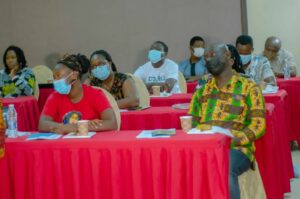The Social Entrepreneurship Hub (SE-Hub) Ghana and Business in Environmental Stewardship Network (BESNet) of A Rocha Ghana have organised a workshop in Takoradi for private companies to orient them about the need to adopt green business approaches in their daily activities.
SE-Hub and BESNet have over the years proactively engaged businesses on the need to value nature in their decision-making and operations. They believe that the key to achieving the Sustainable Development Goals (SDGs) is through conservation and sustainability of natural capital. Thus, governments, individuals and businesses must critically look at how their actions or inactions affect natural capital stocks and flows.
Engaging businesses on their defined roles in a green economy, especially in ensuring environmental sustainability, is crucial for efficiency and effectiveness. For this reason, the SE-Hub and BESNet of A Rocha, Ghana came together to organise this workshop in Takoradi. Three advocates – Mr. James Arthur-Amoah, Mr. Michael Abrokwah and Ms. Mina Pokuaa Agyeman – took participants through the training.

In his presentation, Michael Abrokwah of the GrEEn Project, SNV Ghana introduced the participants to some green business approaches and how beneficial it is for businesses to adopt them. He emphasised that, socially, adopting green economy strategies would lead to a 5 percent poverty reduction by 2030; which will represent a two percent lower scenario than the business-as-usual scenario for 2030.
He also showed how adopting a green economy will create 400,000 jobs in the sector due to the transition leading to demand for more labour. According to him, climate change threatens the essential elements of life for people worldwide, with challenges such as access to water, food production, health, land use and the environment. This has an impact on society and businesses.
He further stated that there are irreversible damages to the environment, hence the need to embrace green economy policies which are aimed at controlling society, the economy and the environment. Mr. Abrokwah pointed out that 75 percent of investments in the green economy are expected to come from the private sector to complement public sector financing.
In her session, Miss Mina Pokuaa Agyemang – Corporate Engagement Officer for A Rocha Ghana, took the participants through what natural capital is and its relevance to businesses. Again, she trained the business-owners on how to conduct an assessment of their impacts and dependencies on natural capital.
She emphasised that there are direct and indirect impacts and dependencies on natural capital at every stage of the value chain in a business’s operations. Therefore, she called on business owners to commit to assessing their impacts and dependencies on nature to reduce their risks while increasing their opportunities. In addition, she pointed out that the measuring and valuing of natural capital in a business’ operation helps to mitigate risks and enhance sustainability of the business.
James Arthur-Amoah, Director of Administration and Projects at SE-Hub, admonished the business owners present at the workshop to adopt green practices introduced to them, because green and sustainable businesses are the future. He assured participants that the Social Entrepreneurship Hub is ever-ready to assist businesses which incorporate these approaches into their activities.
On the 70th anniversary of the United Nations, its members agreed that the SDGs are the new global development blueprint. Peculiar to these goals is the call for partnership in their implementation. Although the membership of the UN comprises heads of state and governments, and high representatives, businesses and private individuals will also play a crucial role in successful implementation of the SDGs.
Recognising that valuing natural capital is fundamental to sustainable development, there is a need to strategically engage businesses to ensure that their operations have a minimal negative impact on the environment and biodiversity. Thus, a ubiquitous and effective strategy is engaging businesses on their role in this green economy agenda that we seek to establish.
According to the United Nations Environment Programme (UNEP), a green economy is defined as having an economy characterised by low carbon, resource-efficient and socially inclusive markers.
It posits that in a green economy, growth in employment and income is driven by public and private investment into economic activities, infrastructure and assets which allow reduced carbon emissions and pollution, enhanced energy and resource efficiency, and preventing the loss of biodiversity and ecosystem services.
Therefore, the private sector needs to be engaged on the importance of investing in green activities to focus on achieving their goals.










